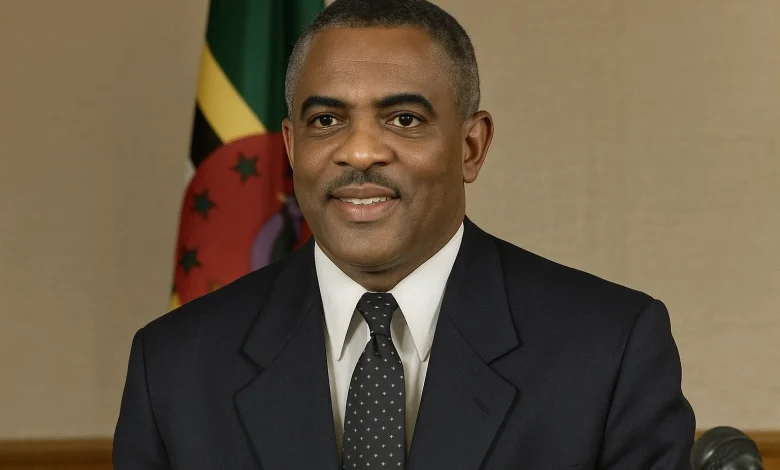Earl Williams

Earl Michael Williams was born on 28 February 1964 in Southall, England, and later returned to Dominica, taking up residence in the village of Salisbury in Saint Joseph Parish. He attended Salisbury Primary School and the Community High School, where he completed his secondary education. Before entering politics, Williams worked as a teacher in various secondary schools on the island and engaged in sports as both coach and player. Beyond his educational profession, he was actively involved in the credit union movement, serving on the supervisory committee and board of the Salisbury Cooperative Credit Union, and later as Treasurer of the Dominica Credit Union League, which broadened his experience in organisational management and community finance.
His legal studies followed, culminating in his admission to the Dominica Bar. This professional background as both educator and attorney aided his entry into the legislative and political spheres of Dominica.
Parliamentary Service and Leadership Roles
Williams formally entered national politics in the 1990 general election, running as the United Workers’ Party (UWP) candidate for the Salisbury Constituency. He won the seat and subsequently held it until 18 December 2009, when he was succeeded by Hector John. His early performance in Parliament marked him as a capable and articulate opposition MP, often engaging in legislative debates with a focus on infrastructure, governance accountability and constituents’ welfare.
In 2005, Williams was called to the Bar, enhancing his credibility both legally and politically. By December of that year, he became the Political Leader of the UWP, succeeding Edison James. Williams assumed the role of Leader of the Opposition on 16 July 2007, replacing Edison James. During his tenure, Williams was seen as a younger generation leader who sought to modernise the party’s approach, emphasising legal reform, transparency and stimulation of private sector growth.
Contributions and Policy Impact
As a Minister of Communications, Works and Housing (during his earlier ministerial tenure when the UWP was in government), Williams played a role in liberalising the telecommunications sector in Dominica and the wider Eastern Caribbean. In particular, his ministry issued licences to new telecom operators, which helped introduce competition into a market that had been dominated by a single provider. This action had implications beyond Dominica, it contributed neatly to discussions within the Organisation of Eastern Caribbean States (OECS) on telecommunications liberalisation and the broader agenda for regional economic integration.
In his time as opposition leader and UWP head, Williams actively challenged the governing majority on issues of accountability, legislative transparency and public-finance oversight. For instance, in 2017 he publicly questioned the integrity of the citizenship by investment (CBI) programme and the issuance of diplomatic passports in Dominica, arguing that lack of transparency posed reputational risks for the country’s economy. These interventions positioned him as a vocal advocate for governance reform, investor confidence and regulatory integrity, topics of growing relevance in small-island economies.
Williams’s background in education, community finance and law informed his political style: he emphasised capacity-building in rural constituencies, encouraged youth engagement in credit unions and cooperatives, and sought to raise the quality of representation within his party and parliamentary caucus.
Controversies, Resignation and Continuing Role
In July 2008, Earl Williams became embroiled in a controversy regarding a land transaction and allegations of impropriety in his legal practice. The situation, amplified by media scrutiny and internal party pressure, led him to announce his resignation as Leader of the Opposition and as Political Leader of the UWP on 30 July 2008. Despite stepping down from party leadership, Williams continued to represent Salisbury in Parliament until December 2009, maintaining his connection to constituents while remaining active in legal practice and public commentary.
The controversy highlighted the tensions between legal professionals entering politics, issues of client-confidentiality versus public accountability, and the heightened scrutiny placed on opposition figures in parliamentary governance.
Legacy and Ongoing Significance
Earl Michael Williams is significant in Dominican politics for joining the national legislature at a young age, rising to key roles in the UWP and leading the party during a critical period of transition. His work in liberalising the telecom sector, advocating for governance reform and representing rural interests in Salisbury demonstrates a multifaceted contribution across education, law and public service.
His tenure in the credit-union movement and his teaching background anchor him within community-based development and youth empowerment efforts, dimensions less visible in Dominican leadership profiles dominated by national-level politics. His legal training also brought a dimension of professional accountability to his political roles: Williams promoted the idea that political leadership in small states required competence, ethics and a balanced approach to governance.
Although his leadership term as Opposition Leader was relatively brief, Williams remains a figure of interest in discussions on political renewal, party modernization and governance in Dominica. His experience highlights the opportunities and challenges of opposition leadership, particularly in the context of electoral politics, parliamentary accountability and the interplay between legal practice and political office.




